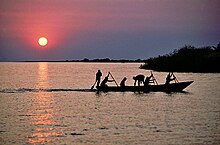Economy of Burundi: Difference between revisions
| Line 60: | Line 60: | ||
==External links== |
==External links== |
||
*{{dmoz|Regional/Africa/Burundi/Business_and_Economy/Economic_Development}} |
*{{dmoz|Regional/Africa/Burundi/Business_and_Economy/Economic_Development}} |
||
*[http://www.trademap.org/open_access/Index.aspx?proceed=true&reporter=108 Burundi latest trade data on ITC Trade Map] |
|||
{{Africa in topic|Economy of}} |
{{Africa in topic|Economy of}} |
||
Revision as of 07:50, 15 June 2011
 Fisherman on Lake Tanganyika | |
| Currency | Burundian franc (BIF) |
|---|---|
| Calendar year | |
Trade organisations | AU, WTO |
| Statistics | |
| GDP | $3.152 billion (2010[update]) Rank: 173rd (2008[update]) |
GDP growth | 4.5% (2008[update]) |
GDP per capita | $425 (2008[update]) |
GDP by sector | agriculture (32.9%), industry (21.3%), services (45.8%) (2008[update]) |
| 10% (2008[update]) | |
Population below poverty line | 53% (2010[update]) |
Labour force | 2.99 million (2002[update]) |
Labour force by occupation | agriculture (89%), industry (5.3%, services (4.1%) (2002[update]) |
| Unemployment | N/A (2008[update]) |
Main industries | light consumer goods such as blankets, shoes, soap, assembly of imported components, public works construction, food processing Agriculture: coffee, cotton, tea, corn, sorghum, sweet potatoes, bananas, manioc (tapioca); beef, milk, hides |
| External | |
| Exports | $88 million f.o.b. (2010[update]) |
Export goods | coffee, tea, sugar, cotton, hides |
Main export partners | Germany 31.3%, Pakistan 6.8%, Belgium 5.8%, Sweden 4.3%, Rwanda 4.3%, France 4.2%, China 4% (2007[update]) |
| Imports | $286 million f.o.b. (2010[update]) |
Import goods | capital goods, petroleum products, foodstuffs |
Main import partners | Saudi Arabia 17%, Kenya 11.4%, Belgium 8.7%, France 6.1%, Uganda 5.4%, Germany 5.4%, India 4.8%, Pakistan 4.2% {2007[update]) |
Gross external debt | $1.2 billion (2003[update]) |
| Public finances | |
| Revenues | $280.4 million 2009[update]) |
| Expenses | $351.3 million (2008[update]) |
| Economic aid | $90.7 million (2010[update]) |
All values, unless otherwise stated, are in US dollars. | |
Burundi is a landlocked, resource-poor country with an underdeveloped manufacturing sector. The mainstay of the Burundian economy is agriculture, accounting for 54%of GDP in 1997. Agriculture supports more than 70% of the labour force, the majority of whom are subsistence farmers. Although Burundi is potentially self-sufficient in food production, the ongoing civil war, overpopulation, and soil erosion have contributed to the contraction of the subsistence economy by 25% in recent years. Large numbers of internally displaced persons have been unable to produce their own food and are largely dependent on international humanitarian assistance. Burundi is a net food importer, with food accounting for 17% of imports in 1997.
Agriculture
The main cash crop of Burundi is coffee, which accounted for 78.5% of exports in 1997. This dependence on coffee has increased Burundi's vulnerability to seasonal yields and international coffee prices.It generates about 90 percent of export revenues, making the country particularly vulnerable to terms of trade shocks: the current account deficit in 2007 ran at 15 percent of GDP.[1] Coffee is the largest state-owned enterprise. In recent years, the government has tried to attract private investment to this sector, with some success. Efforts to privatize other publicly held enterprises have stalled. Other principal exports include tea and raw cotton.
Burundi is the largest banana market in Africa.
Industry
Little industry exists except the processing of agricultural exports. Although potential wealth in petroleum, nickel, copper, and other natural resources is being explored, the uncertain security situation has prevented meaningful investor interest. Industrial development also is hampered by Burundi's distance from the sea and high transport costs. Lake Tanganyika remains an important trading point. The trade embargo, lifted in 1999, negatively impacted trade and industry. Since October 1993 the nation has suffered from massive ethnic-based violence which has resulted in the death of perhaps 250,000 people and the displacement of about 800,000 others. Foods, medicines, and electricity remain in short supply.
Burundi is heavily dependent on bilateral and multilateral aid, with external debt totalling $1.247 billion (1.247 G$) in 1997. A series of largely unsuccessful 5-year plans initiated in July 1986 in partnership with the World Bank and the International Monetary Fund attempted to reform the foreign exchange system, liberalize imports, reduce restrictions on international transactions, diversify exports, and reform the coffee industry.

IMF structural adjustment programs in Burundi were suspended following the outbreak of the crisis in 1993. The World Bank has identified key areas for potential growth, including the productivity of traditional crops and the introduction of new exports, light manufactures, industrial mining, and services. Other serious problems include the state's role in the economy, the question of governmental transparency, and debt reduction.
To protest the 1996 coup by President Pierre Buyoya, neighbouring countries imposed an economic embargo on Burundi. Although the embargo was never officially ratified by the United Nations Security Council, most countries refrained from official trade with Burundi. Following the coup, the United States also suspended all but humanitarian aid to Burundi. The regional embargo was lifted on January 23, 1999, based on progress by the government in advancing national reconciliation through the Burundi peace process.
References
 This article incorporates public domain material from The World Factbook. CIA.
This article incorporates public domain material from The World Factbook. CIA.
